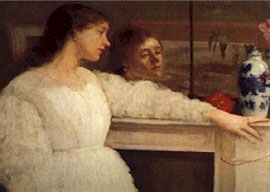
May 05, 2011

She lives on credit and lusts after entertainment, whether emotional or commercial. She derives her pleasure solely from seeing her reflection in the gleam of a man’s eye or in the sheen of a new silk dress. Like a L”Oréal target customer, she is “worth it.” Whatever luxury the world contains should be hers because she is beautiful and of superior sentimentality.
I am not talking about a modern American woman, but about Emma Bovary, born 1857, with no end in sight to her reign of senseless craving and mediocrity.
Why even bother to write about that common hussy? Because here she is loose again in bookstores, made up like a flapper on a sickening pink cover. A new translation is out, and critics are raving. (How many of them speak French, I shudder to ask.)
Madame Bovary: A New Translation by Lydia Davis sounds exactly like what it is”a book written in 21st-century America. Hollywood period movies can be dated by the hairstyles; here the turn of phrase is a dead giveaway. There is “give me a hug” in place of “embrace me,” “deep in her soul” instead of “at the bottom of her soul,” and “waiting for something to happen” rather than “waiting for an event.” Little things, little things, though some would say that even a comma is big when it comes to translation and that a translator should be a slave to the original as the Slav Nabokov was to Pushkin, as the poet Baudelaire was to Poe””servilely attached to the letter” at the risk of producing baroque and even painful results.
There is no pain for the reader in Madame Bovary: A New Translation by Lydia Davis“just smooth, easy, up-to-date, democratic Americanness. It’s a choice, but it’s a shame, because it doesn”t do justice to Flaubert’s style, and however one may dislike what he chose to write about, Flaubert knew how to write.
Emma Bovary the woman is morally quite ugly, but Madame Bovary the book is technically rather beautiful: the deft machinery of the action’s development, the shifting points of view, the treatment of time and space; masterful, swift, seamless. And extremely visual. If Flaubert can be said to have invented anything, it is the cinema. His scenes read like detailed shot lists, progressing from Wide Shot to Medium Close Up to Close Up and punctuated by jump cuts and well-chosen cutaways.
The book is peopled more by caricatures than by characters, but artistically and formally, yes, it is an achievement. But Madame Bovary“”masterpiece of realism,” by Gustave Flaubert, the “inventor of objectivity” as Lydia Davis and so many before her present it”not quite.
Flaubert’s plan was to hide, but his fat form is visible behind every sentence, dripping contempt over the whole of humanity: townspeople and country folk, aristocrats and bourgeoisie, priests and atheists, those with ambition and those without it. One size fits all, and when contempt doesn”t quite cut it, irony will do nicely. If common sense says dans le doute abstiens toi (when in doubt, don”t), Flaubert says dans le doute ironise (when in doubt, use irony).